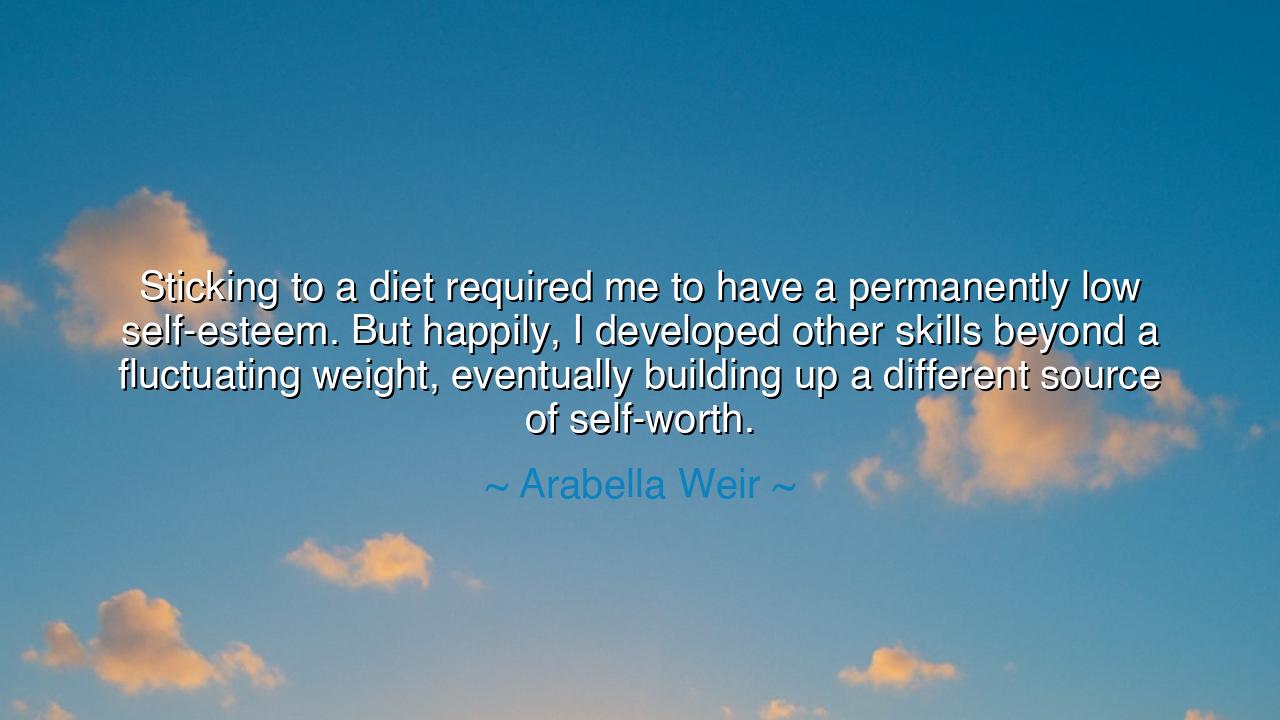
Sticking to a diet required me to have a permanently low
Sticking to a diet required me to have a permanently low self-esteem. But happily, I developed other skills beyond a fluctuating weight, eventually building up a different source of self-worth.






Listen, O children of wisdom, to the words of Arabella Weir, who speaks of the painful struggle that many endure in their pursuit of self-worth: "Sticking to a diet required me to have a permanently low self-esteem. But happily, I developed other skills beyond a fluctuating weight, eventually building up a different source of self-worth." In these words lies a deep truth—a truth that ancient philosophers understood well: true self-worth is not to be found in the external and ever-changing measurements of the body, but in the strength of one’s character, wisdom, and purpose. Weir’s journey speaks to the universal struggle of defining our value not by what we weigh or how we appear, but by what lies within us.
In the days of Socrates, the great philosopher taught that the true essence of a person lies in the mind and spirit, not in the physical form. Socrates did not concern himself with the superficial appearance, but with the cultivation of virtue and wisdom. He believed that to pursue truth and goodness was the true measure of a person’s worth, not the fleeting judgments based on outward appearance. Arabella Weir’s words echo this ancient wisdom, reminding us that the struggle to maintain an idealized body—to adhere to the dictates of external standards—can diminish our self-esteem and disconnect us from what truly matters. In the end, it is not the body we must cultivate, but the spirit.
Consider the example of Alexander the Great, whose military genius and strength were admired throughout the ancient world. Alexander was a man of great ambition, yet he did not define himself solely by his outward appearance or the weight of his body. His self-worth came from his ability to lead, to conquer, and to inspire. He understood that true strength lies not in physical perfection, but in character and the courage to pursue one’s goals. Much like Arabella Weir, Alexander sought a different source of value—one that was not dependent on ever-changing numbers or opinions, but on the essence of his being and his actions.
In the ancient tradition, the great warrior philosophers of Sparta and Rome also understood the importance of inner strength. Cicero, the Roman statesman and philosopher, spoke of the need for balance between body and mind, but he also stressed that the mind must be the strongest part of the person. He believed that virtue, wisdom, and integrity were the true pillars of a person’s worth, not the body’s fleeting appearance. This truth is echoed by Weir, who ultimately transcended the limitations of external appearance by developing other skills that fed her self-worth, just as the ancients sought strength and value from within.
But in the modern world, we often find ourselves caught in the pursuit of external validation—measuring our worth by the fluctuating numbers on a scale, the mirror’s reflection, or the opinions of others. Arabella Weir’s journey reminds us that this path leads only to low self-esteem, for we cannot control the ever-changing nature of the body. If we place our self-worth in the hands of our appearance, we are bound to live in a state of uncertainty and frustration. Weir teaches us that true empowerment comes not from a fluctuating weight, but from the steady cultivation of skills, virtue, and inner strength—the things that remain when the superficial falls away.
The lesson, O children, is clear: self-worth is not found in the fleeting nature of the body or the mind’s desire for external approval, but in the depth of our character. Arabella Weir speaks to this when she says that she ultimately found a different, more stable source of self-worth by cultivating her skills beyond the measure of her body. The ancients knew this truth well—that to seek the external is to live in uncertainty, but to seek the internal, the virtuous, and the meaningful, is to live in steadfast peace and purpose. It is through the pursuit of wisdom, the development of character, and the practice of the virtues that we find the true measure of our worth.
Thus, O children, let us seek to build our self-worth not on the shifting sands of appearance and external validation, but on the solid foundation of virtue, wisdom, and inner strength. Let us embrace the lessons of the ancients, who knew that the mind and spirit are the true sources of lasting worth. And in this pursuit, let us remember that our value is not measured by the weight of our bodies, but by the depth of our actions, the strength of our character, and the beauty of our souls. Like Arabella Weir, let us rise above the superficial, finding true strength and peace in the cultivation of the self from the inside out.






AAdministratorAdministrator
Welcome, honored guests. Please leave a comment, we will respond soon